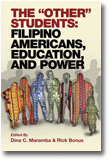
The 'Other' Students
Filipino Americans, Education, and Power
Edited by:
Dina C. Maramba, SUNY Binghamton
Rick Bonus, University of Washington
Published 2012
Though the Filipino American population has increased numerically in many areas of the United States, especially since the influx of professional immigrants in the wake of the 1965 Immigration Act, their impact on schools and related educational institutions has rarely been documented and examined. The Other Students: Filipino Americans, Education, and Power is the first book of its kind to focus specifically on Filipino Americans in education. Through a collection of historical and contemporary perspectives, we fill a profound gap in the scholarship as we analyze the emerging presence of Filipino Americans both as subjects and objects of study in education research and practice. We highlight the argument that one cannot adequately and appropriately understand the complex histories, cultures, and contemporary conditions faced by Filipino Americans in education unless one grapples with the specificities of their colonial pasts and presents, their unique migration and immigration patterns, their differing racialization and processes of identity formations, the connections between diaspora and community belonging, and the various perspectives offered by ethnic group-centered analysis to multicultural projects. The historical, methodological, and theoretical approaches in this anthology will be of interest to scholars, researchers, and students in disciplines which include Education, Ethnic Studies, Asian American and Pacific Islander Studies, Anthropology, Sociology, Political Science, Urban Studies, Public Policy, and Public Health.
CONTENTS
Acknowledgments. Preface. Foreword, Anthony Barretto Ogilvie. Introduction: Filipino Americans as “Others”, Rick Bonus and Dina C. Maramba. PART I: HISTORICAL COORDINATES. Betwixt and Between Colonial and Postcolonial Mentality: The Critical Education of Filipino Americans, Zeus Leonardo and Cheryl E. Matias. “The Real Filipino People”: Filipino Nationhood and Encounters with the Native Other, Benito M. Vergara, Jr. Colonial Lessons: Racial Politics of Comparison and the Development of American Education Policy in the Philippines, Funie Hsu. PART II: EDUCATION AND THE MAKING OF IDENTITIES. Knowledge Construction, Transformative Academic Knowledge, and Filipino American Identity and Experience, Third Andresen. Disaggregating the College Experiences of Filipino Americans: From the Aggregate Asian American/Pacific Islander Experience, Belinda Butler Vea. Counseling Filipino American College Students: Promoting Identity Development, Optimal Mental Health, and Academic Success, Kevin L. Nadal. PART III: FILIPINO AMERICAN STUDIES AND PEDAGOGIES. Struggling to Survive: Poverty, Violence, and Invisibility in the Lives of Urban Filipina/o American Youth, Allyson Tintiangco-Cubales. Theorizing From Pain, Passion, and Hope: The Making of Filipino American Curricula and Pedagogy, Patricia Espiritu Halagao. Invisible Subjects: Filipina/os in Secondary History Textbooks, Roland Sintos Coloma. Kuwento and Karaoke: Literacy Perspectives on Culture and Education, Korina Jocson. Reflections on the Contours of and Trajectory for a Critical Filipino Studies, Antonio T. Tiongson, Jr. PART IV: FILIPINO AMERICANS AND POLICIES IN EDUCATION. Filipino American Access to Public Higher Education in California and Hawai‘i, Jonathan Y. Okamura. Collective Self-Esteem and Perceptions of Family and Campus Environments Among Filipino American College Students, Reynaldo I. Monzon. Pilipinos in the Middle: Higher Education and a Sociocultural Context of Contradictions, Tracy Lachica Buenavista. Sexual Health and Responsibility: The Role of Public Schools in Filipina American Teenage Mothers’ Lives, Charlene Bumanglag Tomas. Exploring the Filipino American Faculty Pipeline: Implications for Higher Education and Filipino American College Students, Dina C. Maramba and Kevin L. Nadal. About the Editors and Contributors.
-
Paperback9781623960735
Web price: $45.04 (Reg. 52.99)
-
Hardcover9781623960742
Web price: $80.74 (Reg. 94.99)
- eBook9781623960759

- EDU037000 - EDUCATION: Research
- EDU020000 - EDUCATION: Multicultural Education
- EDU038000 - EDUCATION: Student Life & Student Affairs
-
 (Re)Envisioning Social Studies Education Research
Current Epistemological and Methodological Expansions, Deconstructions, and Creations
(Re)Envisioning Social Studies Education Research
Current Epistemological and Methodological Expansions, Deconstructions, and Creations
-
 Affirming Identity, Advancing Belonging, and Amplifying Voice in Sororities and Fraternities
Affirming Identity, Advancing Belonging, and Amplifying Voice in Sororities and Fraternities
-
 Creating New Possibilities for the Future of HBCUs
From Research to Praxis
Creating New Possibilities for the Future of HBCUs
From Research to Praxis
-
 Latinx College Students
Innovations in Mental Health, Advocacy, and Social Justice Programs
Latinx College Students
Innovations in Mental Health, Advocacy, and Social Justice Programs
-
 Learning to Hide
The English Learning Classroom as Sanctuary and Trap
Learning to Hide
The English Learning Classroom as Sanctuary and Trap
-
 Special Education During the Pandemic
Considerations for Change in Practice
Special Education During the Pandemic
Considerations for Change in Practice
-
 What Comes After Lunch?
Alternative Measures of Economic and Social Disadvantage and Their Implications for Education Research
What Comes After Lunch?
Alternative Measures of Economic and Social Disadvantage and Their Implications for Education Research

